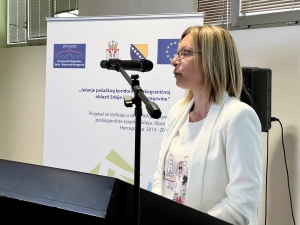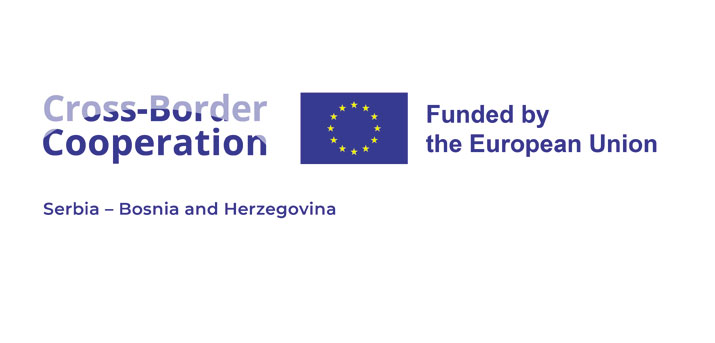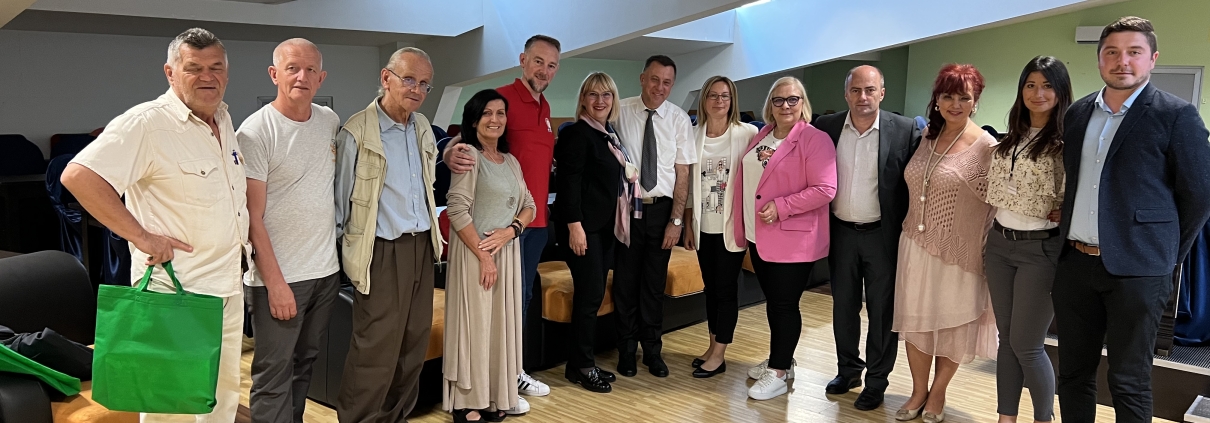TUZLA – The opening conference of the project Strengthening the Pedestrian Corridor in the Cross-Border Area of Serbia and Bosnia and Herzegovina – E-CrossPass took place yesterday in Tuzla. E-CrossPass project is co-financed by the European Union within the Cross-border Cooperation Programme Serbia-Bosnia and Herzegovina within IPA II 2014-2020. The contract has been signed between the beneficiaries and the Ministry of Finance of the Republic of Serbia.
Head of Operations Section III (Social Development, Civil Society and Cross Border Cooperation) of the EU Delegation to Bosnia and Herzegovina, Mr. Gianluca Vannini pointed out that the E-CrossPass project would improve tourist potentials in the local communities in the cross-border region thus increasing their income and improving life in general.
„European Union will continue to support Cross-border Programme Serbia-Bosnia and Herzegovina with the additional 14 million. Thanks to this project 12 municipalities will get pedestrian corridor that will enable citizens sto spend more time in the nature. Bosnia and Herzegovina has many natural resources which are a great potential for tourism development. European Union is ready to support cross-border projects to contribute to the development of economy in the regon“, said Mr. Vannini.
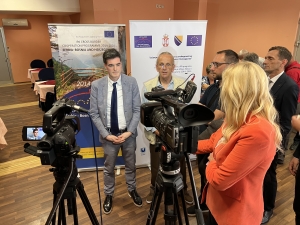
The project is implemented in partnership by the Tourist Organization of Užice, Mountaineering Society “Konjuh” from Tuzla, Ministry of Spatial Planning and Environmental Protection of the Tuzla Canton, and the Mountaineering Association of Serbia.
Minister Mrs. Anela Ajšić pointed out that tourism and ecology are connected and any investment in tourism encourages investments in environment protection. This is the reason Ministry for Spatial Planning and Environmental Protection supported the E-CrossPass project.
“Whenever we promote such infrastructure for pedestrians, we promote EU requirements for Bosnia and Herzegovina. Also, Tuzla Canton Government in its Strategy for Tourism development participated in the strengthening of the hiking tourism by marking pedestrian trails. With this project we promote pedestrian tourism, sustainable tourism, and environmental protection, said Mrs. Ajšić.
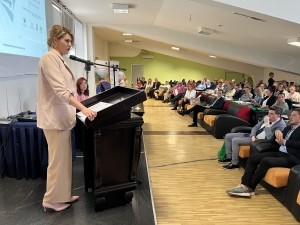
Assistant Minister for Tourism of the Republic of Serbia, Mrs. Dunja Đenić said that E-CrossPass project has a significant importance in the development of regional tourist products which that could enable increase in number of tourists and reminded everyone on the previous good cooperation with the city of Tuzla.
“So far Serbia has a very good cooperation with Bosnia and Herzegovina in cross-border projects, this is especially the case with cities Užice and Tuzla that successfully implemented several projects. The objective of this project is regional cooperation and improvement of tourism “, emphasized out Mrs. Đenić.
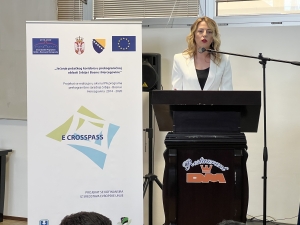
Assistant Minister for Tourism and Environment of the Federation of Bosnia and Herzegovina, Mrs. Farida Cikotić stressed importance of the project for the health of people.
„Our development strategy recognizes rural tourism out of which a pedestrian tourism is an integral part. I hope that this project brings new members for associations of mountaineers and improvement to Hike-In Lodges“, said Mrs. Cikotić.
Mayor of Tuzla Mr. Zijad Lugavić congratulated to the project management of the E-CrossPass for the benefits project provides for the citizens of the region.
„This is what makes the project even more important for the future users of the pedestrian corridors and mountaineering associations in genera. City of Tuzla has previously successfully implemented many projects funded by EU. I am sure this project will be one of them. “, pointed out Mr. Lugavić.
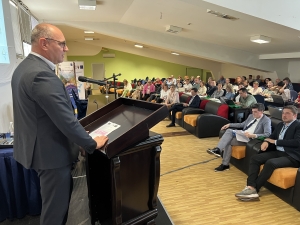
Mr. Miodrag Petković, member of the Užice City Council said that E-CrossPart project is important for the City of Užice.
“Development of tourism is a strategic goal of the City of Užice. I believe that this project with the financial help of the European Union and city budget would significantly improve tourism in the region. I am sure that our local communities will benefit from the project. “, said Mr. Petković.
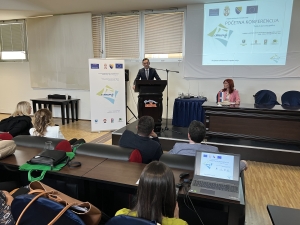
The project aims to contribute to the sustainable development of local communities, revive and enhance outdoor tourism in the cross-border area between the Tuzla Canton and the Western Serbia region. By introducing relevant European practices and standards through the improvement and integration of infrastructure for hiking tourism, joint hiking trails with a total length of 580 km will be established. The trails will be mapped, marked, and equipped in accordance with the standards of the European Ramblers’ Association (ERA) as part of the European walking route E7. The project will focus on the training and education of local human resources to create a quality tourism offer in the region.
“Our plan is to establish one pedestrian corridor that will connect Tuzla and Užice, namely Konjuh mountain with the national pards of the Western Serbia. We will start marking the trails very soon“, explained Mr. Sabid Zekan, president of the Mountaineering Society “Konjuh”.
Project E-CrossPass will last for two years. The total value of the project 403,440.81 EUR, with the European Union providing 342.892,72 EUR.
One of the main goals of the project is to promote outdoor tourism in the cross-border area, focusing on the rural areas, local culture, and authenticity. Protected areas will be especially promoted to the tourists that are looking for the connection with the nature and aim to explore and experience natural and cultural beauties of the region.
During the opening conference in Tuzla importance of the project and outdoor tourism in the cross-border region was pointed out also by the Director of the Tourist Organization of Užice, Mrs. Danijela Đorđević Arsić, Director of the Tourist Organization of the Western Serbia Mr. Miroslav Rađen and Mrs. Dušanka Selaković, Project Manager of the E-CrossPass project.
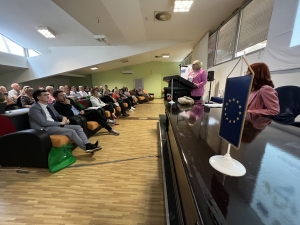
*E-trails/corridors are European pedestrian corridors. These corridors encompass vast areas and are set by the European Rambles’ Association. They connect national and regional pedestrian corridors and offer intercultural experiences across borders. The first pedestrian corridor in Europe was founded in 1938 in Hungary. Today the network has 12 E-corridors and covers more than 65.000 km.
